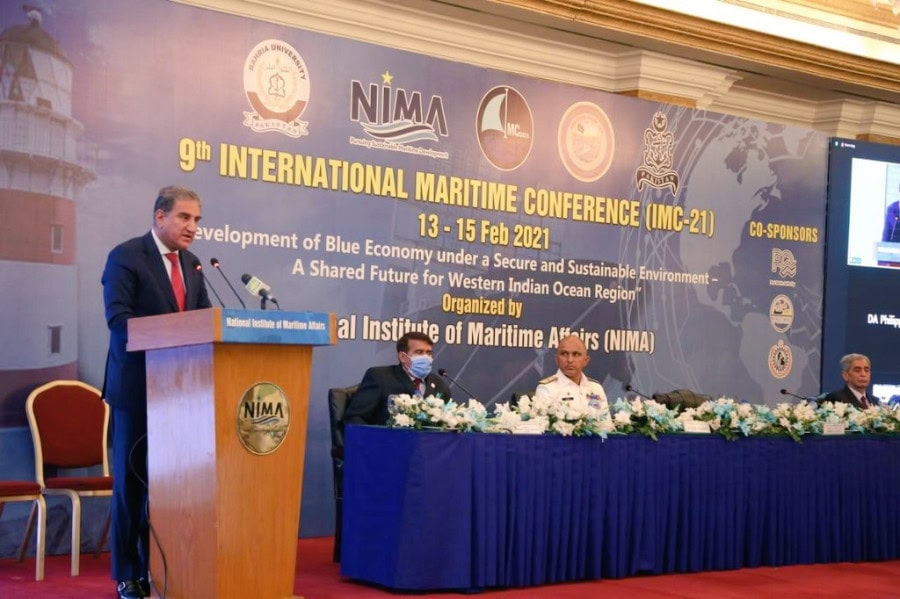KARACHI – In pursuance of its hegemonic designs, India has nuclearized the Indian Ocean and continues to induct advanced weapons systems and naval delivery platforms, highlighted Foreign Minister Shah Mahmood Qureshi on Monday.
He was addressing the ongoing 9th International Maritime Conference (IMC-21) in Karachi. The three-day IMC-21 kicked off in Karachi on February 13 under the auspices of the Pakistan Navy, and it will last till February 15, 2021.
The Conference is being organized by the National Institute of Maritime Affairs (NIMA) under the theme “Development of Blue Economy under a Security and Sustainable Environment – A Shared Future for Western Indian Ocean Region”.
Sustainable Blue Economy critical for reaping socio-economic benefits now & in future. To that end, under my Public Diplomacy Initiative, Foreign Office introduced a robust #EconomicDiplomacy strategy engaging Missions abroad to cultivat investments for maritime sector in 🇵🇰. https://t.co/HI4x2DUD1T pic.twitter.com/qbSYkETgwV
— Shah Mahmood Qureshi (@SMQureshiPTI) February 15, 2021
The foreign minister said that the Indian Ocean offered promising potential for mutual cooperation and collaboration. But geo-strategic competition and the pursuit of military dominance by some states have gravely jeopardized that potential.
“In particular, India’s belligerent and aggressive policies – currently driven by an extremist Hindutva ideology – pose an immediate and pervasive threat to international and regional peace and security,” he said.
He said that the Indian Ocean hosts international maritime traffic that includes half of the world’s containerized cargo, one-third of its bulk cargo, and two-thirds of its oil shipments.
“Yet, emerging issues, ranging from piracy and territorial water disputes, to global environmental pressures on coastal and marine resources, pose considerable challenges for policymakers,” the foreign minister highlighted.
In light of these developments, Pakistan will continue to take all necessary measures to ensure its security and to maintain credible minimum deterrence, he announced.
The international community needs be cognizant of the fact that any military conflict in South Asia could endanger stability in a region that is critical for global trade flows and security.
Blue Economy
Qureshi said that the idea of ‘Blue Economy’ is a relatively new concept, adding: “A sustainable Blue Economy is critical for reaping the socio-economic benefits for current and future generations”.
Economists have estimated the global value of Blue Economy to be over US$ 24 trillion, the foreign minister highlighted.
Moreover, it can have profound implications on the region in the coming decades, he added.
FM Appreciates Pakistan Navy’s Role
Pakistan is blessed with an over one thousand-kilometer-long coastline, and avast Exclusive Economic Zone, he said, adding that the maritime sovereignty of Pakistan spans an area of 290,000 square kilometers, around 36.4% of its mainland.
He said that Pakistan is an important stakeholder in the Indian Ocean security framework, which includes counter-piracy as well as human trafficking and narcotics smuggling.
“We are proud that the Pakistan Navy continues to maintain a robust security posture along Pakistan’s coast and in the regional seas, in order to prevent nefarious elements from illicit activities in the maritime domain”.
The Pakistan Navy has always been appreciated for its efforts to promote peace and security. Among others, it has been actively participating in the Combined Task Forces 150 and 151 in the larger interest of the international community and regional maritime security, he said.
Our Navy has also provided valuable assistance at the high seas to vessels in distress, including during anti-piracy operations, and has extended humanitarian assistance to regional countries on several occasions.
Gwadar Port a game-changing project
The China-Pakistan Economic Corridor (CPEC) and development of the Gwadar Port are game-changing projects that have further enhanced the geo-economic significance of Pakistan.
The Gwadar Port, which occupies a strategic location overlooking the Strait of Hormuz and the North Arabian Sea, has the potential to develop into a full-fledged regional hub and a trans-shipment port.
It places Pakistan at a point of convergence, linking active sea-lanes to landlocked Central Asian Republics for shipment of oil, coal and agricultural products.
Gwadar Port also provides new vistas for businesses. Extraction of life-saving medicines, coastal tourism, and the development of coastal real estate are industries that are attracting investment, both local and foreign.









